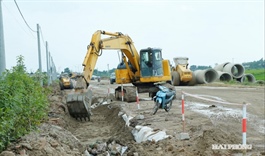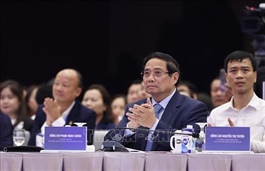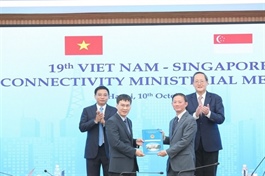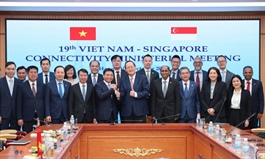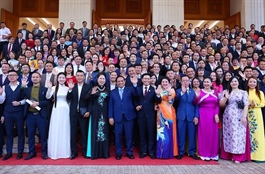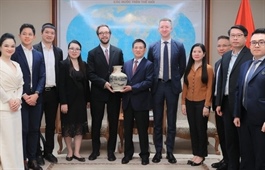ACCA and SAV explore AI’s role in modernising public auditing
ACCA and SAV explore AI’s role in modernising public auditing
The Association of Chartered Certified Accountants and the State Audit Office of Vietnam convened a high-level forum in Hanoi to explore how AI can enhance public auditing and financial governance.
On October 13, more than 100 participants attended the international dialogue on AI in auditing, including senior leaders from the State Audit Office of Vietnam (SAV), the Association of Chartered Certified Accountants (ACCA), domestic and international auditing firms, banks, and professional associations. The event focused on leveraging technology, particularly AI, to improve public audit efficiency and modernise public financial management.
In his opening remarks, Bui Quoc Dung, SAV’s deputy auditor general, declared that AI is fundamentally transforming the way the auditing sector operates.
“I believe the strength of the auditing profession does not come from individual nations, but from the connection of knowledge, data, and international standards. AI requires not just a change in tools, but also a transformation in thinking, from examining what has happened to analysing what is happening and forecasting what will happen; from auditing documents to auditing data; and from reporting results to providing value-driven recommendations for public policy,” said Dung.
“This means that auditors in the new era must embody three qualities: integrity, intelligence, and responsibility, all in service of citizens and sustainable development,” he added.
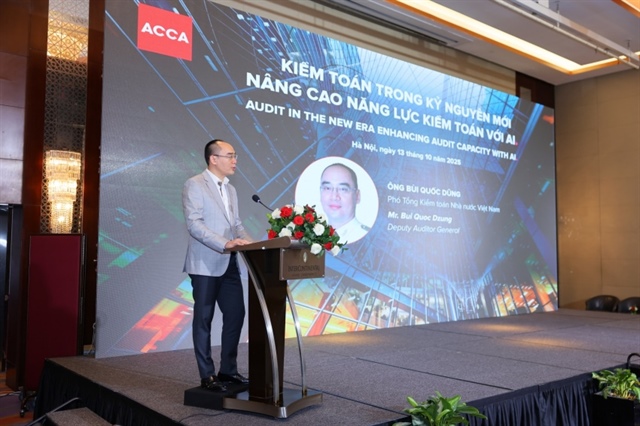
Bui Quoc Dung, SAV’s deputy auditor general at the international dialogue. Photo: ACCA Vietnam |
Dung revelaed that the SAV has begun developing a large data platform, selecting appropriate technological architecture, and establishing data connectivity and sharing mechanisms with the Ministry of Finance, Vietnam Social Security, and the State Bank of Vietnam, creating a data warehouse of over 100 million records to support audit analytics.
“We have developed an auditing technology ecosystem implementing six AI and data-driven applications, covering budget data analysis, risk assessment, financial transaction verification, public investment monitoring, and green expenditure evaluation. Early results indicate that AI does not replace auditors – it empowers them, making their work more accurate and insightful,” said Dung.
“From a public governance perspective, AI helps detect irregularities more quickly and enables risk forecasting, policy recommendations, and decision support in public financial management, fully supporting the shift from post-audit to proactive, intelligent, real-time auditing,” he added.
Representing ACCA, Global president Ayla Majid expressed deep appreciation for the strategic partnership with SAV in reforming public sector auditing.
“The SAV is uniquely positioned to guide this journey. By embedding AI responsibly into audit processes, and by developing frameworks to scrutinise AI systems themselves, it can help ensure that the promise of AI translates into lasting public value,” said Ayla.
“AI will not replace the professional auditor, but it will reshape the way assurance is delivered. For the public sector, the challenge is to capture efficiency gains while safeguarding accountability. ACCA’s research and recommendations show that this balance is achievable,” she added.
Majid also shared that ACCA launched a redesigned global qualification initiative in June to prepare finance professionals for the complex challenges of today’s world, from economic volatility and climate change to geopolitical tensions.
“This is the core of our new curriculum, preparing professionals to navigate the complexities of a rapidly changing world,” she said.
Sharing insights from ACCA’s global research, including the AI Monitor series, Majid noted that while 85 per cent of finance professionals believe AI will transform their roles, fewer than one-third currently have access to structured upskilling opportunities.
“This gap highlights the need for investment in technology, without ignoring human capabilities,” added Majid. “We believe that public finance professionals must be equipped not just with technical proficiency, but with ethical reasoning and critical thinking. They must understand how AI models are trained, what biases may exist, and how outputs should be interpreted. They don’t need to be data scientists, but they must be able to collaborate with them.”
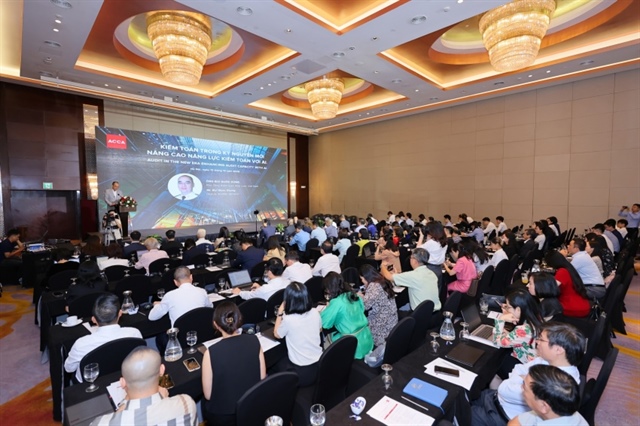
ACCA's Global president, Ayla Majid. Photo: ACCA Vietnam |
2025 marks a deepening collaboration between SAV and ACCA, with a series of notable initiatives: an AI-focused symposium in May, International Financial Reporting Standards training for public auditors, and continuing professional development activities for banking sector personnel. These efforts enhance technical capabilities while promoting the integration of Vietnam’s public audit practices with global standards.
The event reaffirmed the strategic partnership between SAV and ACCA as a cornerstone in strengthening public audit capacity, boosting transparency, and ensuring accountability in the digital age.
As part of the international dialogue event, two thematic panel discussions offered multidimensional and practical insights from leading financial, auditing, and technology organisations, helping to shape a comprehensive picture of the evolving role of AI in the modern accounting and auditing profession.
The first session was moderated by To Quoc Hung, country manager of ACCA Vietnam, and brought together speakers including Nguyen Ngoc Lan Anh, head of Technology and Operations at Standard Chartered Vietnam; Phan Ngoc Anh, deputy general director of Audit Services at Deloitte Vietnam; and Dr. Pham Huy Thong, deputy director general of the SAV's IT Department.
The discussion highlighted emerging trends in integrating AI into business and audit strategies in Vietnam, responsible AI governance within the finance and banking sectors, and the challenges related to infrastructure, cybersecurity, and digital ethics.
Speakers also shared real-world examples of AI implementation across major audit firms, offering valuable lessons on how to deploy AI effectively while ensuring regulatory compliance and maintaining transparency, particularly in multinational operational environments.
The second session was moderated by Dam Xuan Lam, partner at KPMG Vietnam, and focused on the pivotal role of public auditing in encouraging transparency and accountability.
Among the distinguished speakers were ACCA’s global president Ayla Majid, Hoang Van Luong from the SAV, and Ngo Hoang Ha from Techcom Securities, who shared insights into AI policy frameworks in the public sector.
The session examined the application of AI, big data, and digital technologies in public financial oversight, alongside emerging models of public-private collaboration between the SAV and private audit firms to enhance audit capacity for complex national projects.
Experts at the event agreed that AI implementation is not merely a technical issue, but a matter of governance, ethics, and accountability. Public-private partnerships, such as the one between SAV and ACCA, are seen as key to enhancing audit capacity for large-scale projects, optimising resources, and ensuring transparency in public investment.

Photo: ACCA Vietnam |
- 19:00 13/10/2025




